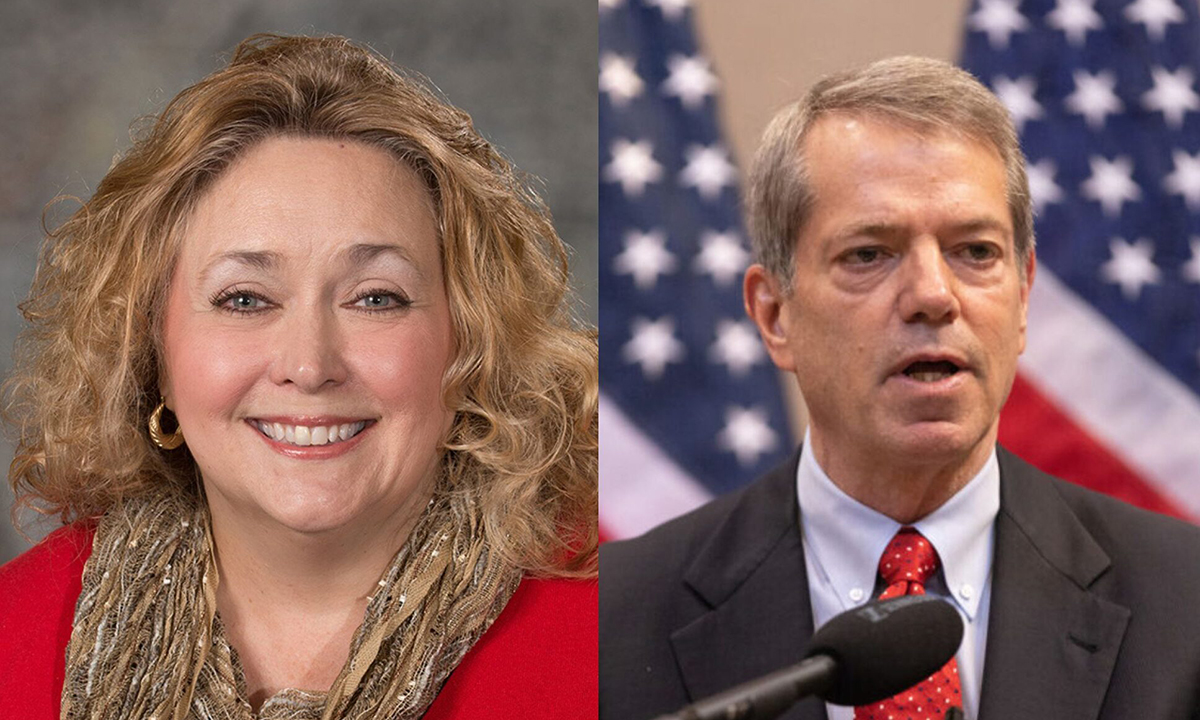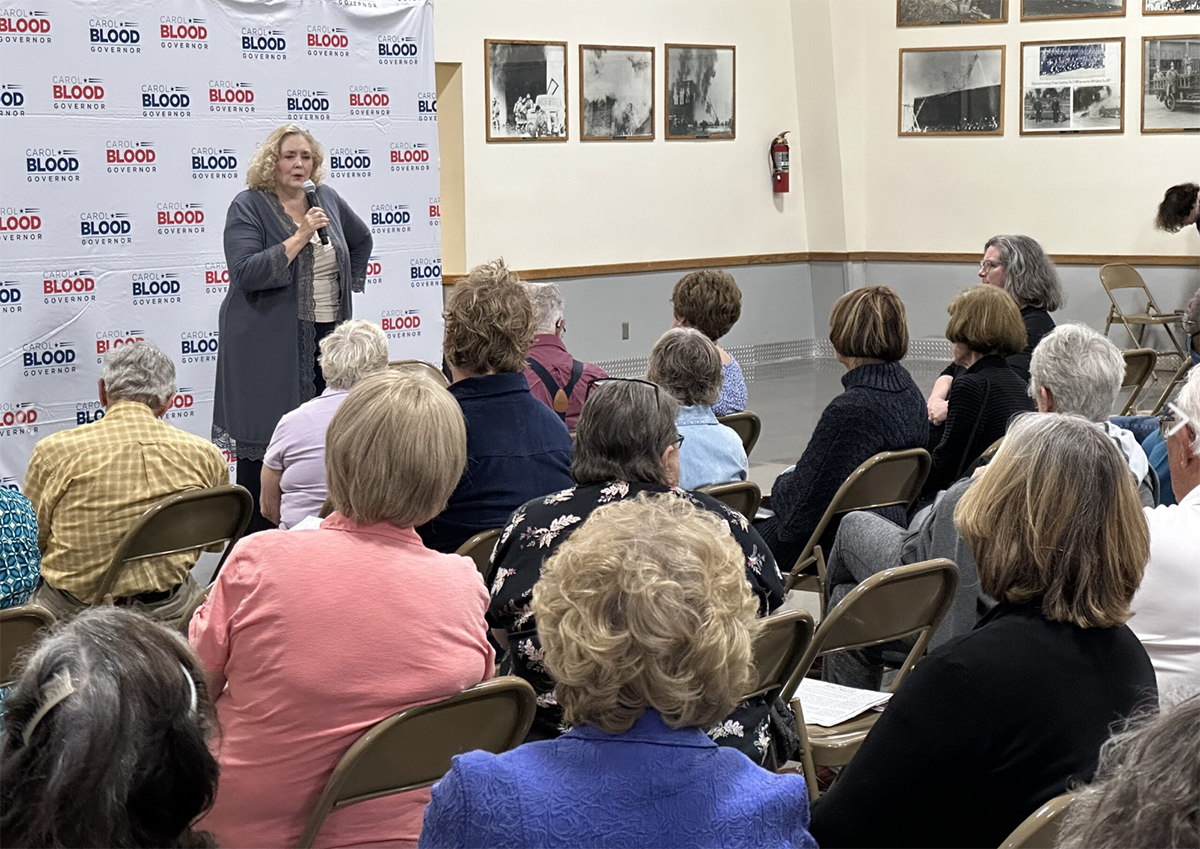Q&A: Nebraska’s Candidates for Governor Talk Education, School Leadership, Taxes
Examiner spoke with major party candidates about key issues; first in a series

Get stories like this delivered straight to your inbox. Sign up for The 74 Newsletter
Nebraska voters didn’t get a chance to size up the major candidates to replace Gov. Pete Ricketts on the debate stage this year.
Republican nominee Jim Pillen declined to debate, describing the process as political theater. His Democratic opponent, State Sen. Carol Blood, criticized the move.
So the Nebraska Examiner interviewed both candidates last week about several key issues. We’ll present these in a question-and-answer format over the next few days. Today’s topics are K-12 education and property taxes. Their answers were edited for brevity and clarity.
Q: What, if anything, needs fixing in Nebraska’s K-12 education system, and what would you do to fix it?
Pillen: Nebraskans agree that our future’s our kids. And we can never, ever, ever give up our kids, whether it’s a teacher, it’s a coach, no matter what the circumstances are. It takes a village to raise our kids. We can never give up on a kid. They are our future. And yet, the state of Nebraska has. We’ve quit on the kids in 158 of the 244 school districts (in state aid to education formula funding, which is meant to equalize aid to schools). When Nebraskans understand that, they gasp.
It’s unacceptable. It’s not Nebraska. It’s not fair. That has to be changed. And it has to be done to have the money follow the student. Then it’s all local. Our schools are locally controlled. Each school district needs to figure out how they adjust or overcome that, or how they have less property taxes because of that change.
Blood: I believe in a PK (pre-kindergarten) through 14 (postsecondary) education. Nebraska can do universal child care. We know that anything prior to kindergarten is really important because we make sure that we give kids a good start in life when it comes to education. It’s really an opportunity for us to catch red flags, when it comes to things like the cycle of violence, the cycle of poverty. It gives us an opportunity to lift up those families and get them help. We have put tens of millions of dollars into the infrastructure of our community colleges. We can allow all of our high school seniors the opportunity to get up to a two-year degree. … It can be in the trades. It can be in ag. It can be in insurance. It can be in IT, health care. But what’s awesome about it is that they can walk out of there with no college debt.
The TEEOSA (state aid to schools formula) is antiquated. It doesn’t work. We do know that two-thirds of schools don’t get state aid, and then that means that they depend on the wealthiest landowners in their districts. And that’s not fair and equitable. So when we go to fix the school aid issue, the first thing we have to know is that we have to fully fund all of our schools, especially if we want to lower property taxes.

Q: How would you fund those changes?
Pillen: TEEOSA has had so many special interests added on for 35 or 40 years, whatever it’s been, and it’s so complicated that you can’t find anybody who even understands it. So it’s just got to be bone dry, common-sense simple that Nebraskans can always understand. I’m not talking about defunding. I’m talking about changing the funding. So let’s just keep it simple math. A billion dollars of state funds divided by the number of students, and the funding follows a student to the school district. So it’s per student funding, not per district funding.
Blood: It’s not going to be one thing … it’s going to be multiple things. I think we really missed an opportunity with Senator (Lynne) Walz’s bill, a bill that would’ve lowered everybody’s property taxes, would have fully funded … all of our schools in Nebraska, and it would’ve been a one penny difference in your sales tax. Nobody likes to be taxed, but when you compare it to the balance of what everybody would have saved property-tax wise … I think the public would have been in favor of it. I also have been looking at our (state) budget, and we … have money that we don’t use wisely that we can shift. Then it’s going to be a matter of what are we willing to agree upon.
Q: Where do you stand on charter schools and why?
Pillen: I’m a big-time believer in competition. When you have free market competition, it brings the best out of the human spirit. And I’m a believer that you shouldn’t have to be wealthy to be able to go to a school. Public school systems are captive markets. So if you live in a school that is underperforming on achievement and you have no other choice for a child, I believe that’s wrong. I believe you should have an option, and that’s why I support charter schools.
Blood: I believe in public dollars for public schools with no exceptions. If you are interested in school choice, the nice thing about Nebraska is that you truly do have school choice. If you don’t like the school system you’re in, you have the ability to go to another school system. I think it’s interesting that some of the same people that are pushing for charter schools and for vouchers are the same ones that are trying to gut our public schools. And I wonder when I see this if they’re purposely trying to gut our public schools and make our teachers the villains so they can promote their own messaging.

Q: What role, if any, should the governor play in K-12 education in Nebraska, and how does that fit with the traditional roles of the State Board of Education and local school boards?
Pillen: It can be challenging to find the truth. The facts are really simple. If you go look at state statutes, the state … Board of Education makes recommendations. They have no statutory authority. They may be responsible for distributing some federal funding, but they have no statutory authority. So the authority rests again in local government with our local school boards. I’m a believer that we need to make sure all of our school boards understand that it is their say if a recommendation comes down that is not appropriate for your local school board. You say, “Sorry, state. We don’t care what you think. This is what’s best for our community and our school.”
Blood: I think as a leader in the executive branch as governor, if you want to lead the state, you have to lead by playing a role in education. Now there’s a difference between playing a role in it and demonizing it. I think the governor has to play a role because we are a very educated state. We have to play a role, but we have to be careful not to demonize when we don’t agree with something, and I do think it’s really unfortunate that our executive branch has been trying to take away funds. It says in our State Constitution … we’re going to provide education for the children of Nebraska.
Q: What is your plan to address property taxes at the state level? How would people pay for local services like education and public safety that property taxes fund?
Pillen: I think there are a couple or three approaches. One is that we just absolutely have to decrease spending and run government like a business and make sure that a whole lot of initiatives that were put in with a good step forward that doesn’t work, then we stop doing it if they’re not creating value. We need to just focus on what Nebraskans need, not things that would be nice. So I think we can make government certainly more efficient. … And then the other is I believe that our property taxes are too high. … Property tax has to be solved because it’s so out of whack. It is affecting every Nebraskan, whether you own property or not, because it’s on your rent.
It’s a state issue and it’s a local issue. We have to make sure local governments behave responsibly and become more efficient, as well. You have to run county government differently. Not every road needs to be gravel. Not everything that we used to do is a service needed. Quit spending money and tighten up in county government so we can have an impact. If our community is growing and we need another school … our high-performing kids waste their senior year in high school. Let’s get these kids into college sooner so we don’t keep spending money on more buildings and start doing business differently.
Lastly would be how property is appraised. It is just totally wrong. Let’s just pick a county that’s growing. All of a sudden, somebody’s farm ground is appraised at $30,000 an acre, which is not farmland value. Then they’re getting appraised for property tax that … the land can’t produce, much less make a living off the investment on that. We need to change that and work hard with the Unicameral on an income-based approach. That, then again, forces all of us to be running government like a business.
Blood: We’ve come up with a lot of legislation to lower property taxes, and ultimately, nobody’s property taxes are lower. Until we stop unfunded and underfunded (state) mandates and fully fund our schools, we will never have true property tax relief. We know when Ben Nelson was governor, there were two reports done — one for schools and one for counties. It said the underlying cause of property taxes being high is these mandates, and they need to be stopped.
During the last recession … they had a bill that took away aid to local government, which is kind of when our property taxes really started to skyrocket. That aid had always balanced the property tax issue, kind of balanced the way things worked, because they knew we were handing down mandates … we made sure it’s not a burden. When they took that away, it became a bigger burden. We limit the tools they can use to pay for these things. Look at our smaller counties, like Johnson County. When they have an inmate die in their state prison (at Tecumseh), they have to pay for the autopsy and grand jury investigation. It isn’t that we don’t want those services, it’s that we don’t get the choice on how we pay for them. I had that constitutional amendment.
I really believe voters should have gotten to choose whether we should be able to pass a bill without showing how we’re going to pay for it first. That’s kind of our jobs. We can pass good laws without having to pass down the cost. … We put the burden on the counties. Eventually, they get to a breaking point where they have to pay for it. They pay for it by raising our property taxes. … We’ve got to start there, because no matter what legislation we pass, as long as we keep handing down those mandates and we don’t allow people to vote on whether we should do it, it’s never going to change.
Nebraska Examiner is part of States Newsroom, a network of news bureaus supported by grants and a coalition of donors as a 501c(3) public charity. Nebraska Examiner maintains editorial independence. Contact Editor Cate Folsom for questions: [email protected]. Follow Nebraska Examiner on Facebook and Twitter.
Get stories like these delivered straight to your inbox. Sign up for The 74 Newsletter

;)